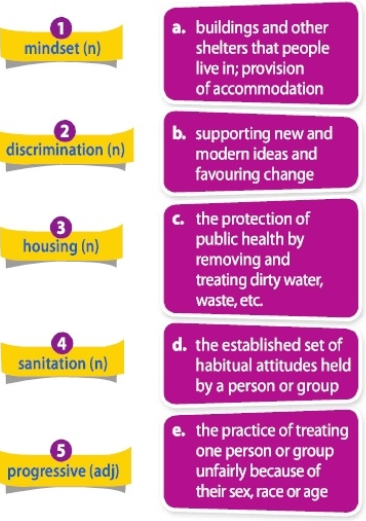Question
Tự luận
3. (Trang 25 - Tiếng anh 12): Listen to a talk about urbanisation and choose the best title for it.
(Nghe cuộc nói chuyện về đô thị hóa và chọn tiêu đề tốt nhất cho nó.)
Bài nghe:
A. Causes of urbanisation
(Nguyên nhân của đô thị hóa)
B. Pros and cons of urbanisation
(Ưu điểm và nhược điểm của đô thị hóa)
C. How to reduce the negative impact of urbanisation
(Làm thế nào để giảm thiểu tác động tiêu cực của đô thị hóa)
Nội dung bài nghe:
Hello, everyone. Last week, we talked about the cause of urbanisation. Today, I'll discuss its advantages and disadvantages.
Urbanisation can bring about a lot of benefits. It can offer people from rural areas not only opportunities for better-paid jobs, but also access to schools, hospitals and other social services. As a result, people's overall standard of living can improve.
People in rural areas tend to be more conservative and follow old-fashioned practices like child marriage and gender discrimination. The process of urbanisation can actually change their mindset and help them to accept more progressive ideas.
However, there are also some obvious disadvantages. High rates of urbanisation can contribute to more crime in big cities. Although many people benefit, not all get the opportunity of a good and stable job. Unemployed, people are more likely to engage in robbery, kidnapping, murder and other illegal activities. Another problem caused by urbanisation is the shortage of affordable housing in big cities, which can result in growth of slums with no sanitation or drinking water. In addition, urbanisation leads to the shift of the working population from agriculture to industries. Labour shortages in rural areas are likely to result in a decrease in agricultural and food production as well.
To sum up urbanisation can bring social and health benefits; however, it also has its own drawbacks. I've only discussed some of them. If you have any questions or comments, please feel free to raise them and I'll try my best to answer them.
Bài làm:
Read more: Unit 2 lớp 12: Listening trang 25
Verified Answer
Hướng dẫn dịch:
Chào mọi người. Tuần trước, chúng ta đã nói về nguyên nhân của đô thị hóa. Hôm nay, tôi sẽ bàn về thuận lợi và bất lợi của nó.
Đô thị hóa có thể mang lại rất nhiều lợi ích. Nó có thể cung cấp cho con người từ vùng nông thôn không chỉ là những cơ hội kiếm việc làm có mức lương cao hơn, mà còn được tiếp cận với trường học, bệnh viện và các dịch vụ xác hội khác. Kết quả là mức sống chung của người dân có thể được cải thiện.
Người dân ở khu vực nông thôn có xu hướng bảo thủ hơn và cổ hủ như hôn nhân và phân biệt giới tính. Quá trình đô thị hóa có thể thực sự thay đổi suy nghĩ của họ và giúp họ chấp nhận những ý tưởng tiến bộ hơn.
Tuy nhiên, cũng có một số nhược điểm hiển nhiên. Tỉ lệ đô thị hóa cao ở các thành phố lớn có thể gây ra nhiều tội phạm hơn. Mặc dù nhiều người có lợi ích, nhưng không phải tất cả đều có cơ hội việc làm tốt và ổn định. Thất nghiệp, nhiều người có khả năng tham gia vào các vụ cướp, bắt cóc, giết người và các hoạt động bất hợp pháp khác. Một vấn đề khác gây ra bởi đô thị hóa là thiếu nhà giá rẻ ở các thành phố lớn, có thể dẫn đến sự gia tăng khu ổ chuột không vệ sinh hoặc nước uống. Thêm vào đó, đô thị hóa dẫn đến sự dịch chuyển lao động từ nông nghiệp sang công nghiệp. Thiếu lao động ở nông thôn cũng có thể làm giảm sản xuất nông nghiệp và lương thực.
Tổng kết lại của việc đô thị hóa có thể mang lại lợi ích cho xã hội là sức khỏe con người; tuy nhiên, nó cũng có những hạn chế của riêng mình. Tôi chỉ bàn về một số trong tất cả. Nếu bạn có bất kỳ thắc mắc hoặc ý kiến nào, vui lòng đề xuất lên và tôi sẽ cố gắng hết sức để trả lời.
Đáp án: Chọn B.
Related questions
Câu 3:
2. (Trang 25 - Tiếng anh 12): Match the words with their meanings.
(Nối từ với nghĩa của chúng.)
